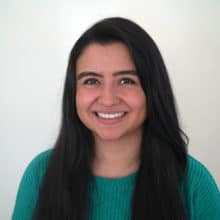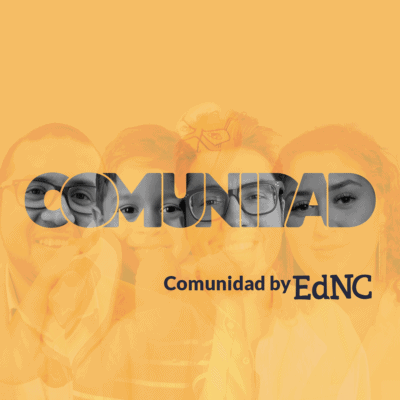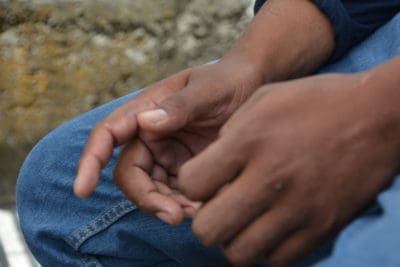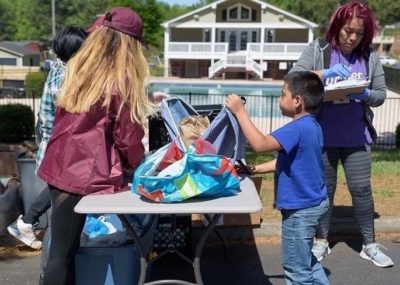Editor’s Note: Carol Bono is a multimedia reporter with a passion for ESL and Latinx students. This is a reporter’s notebook looking behind the scenes of her reporting during COVID-19 and looking forward to EdNC’s future Latinx content.
Haz clic aquí para leer este artículo en español.
Meet me, Carol
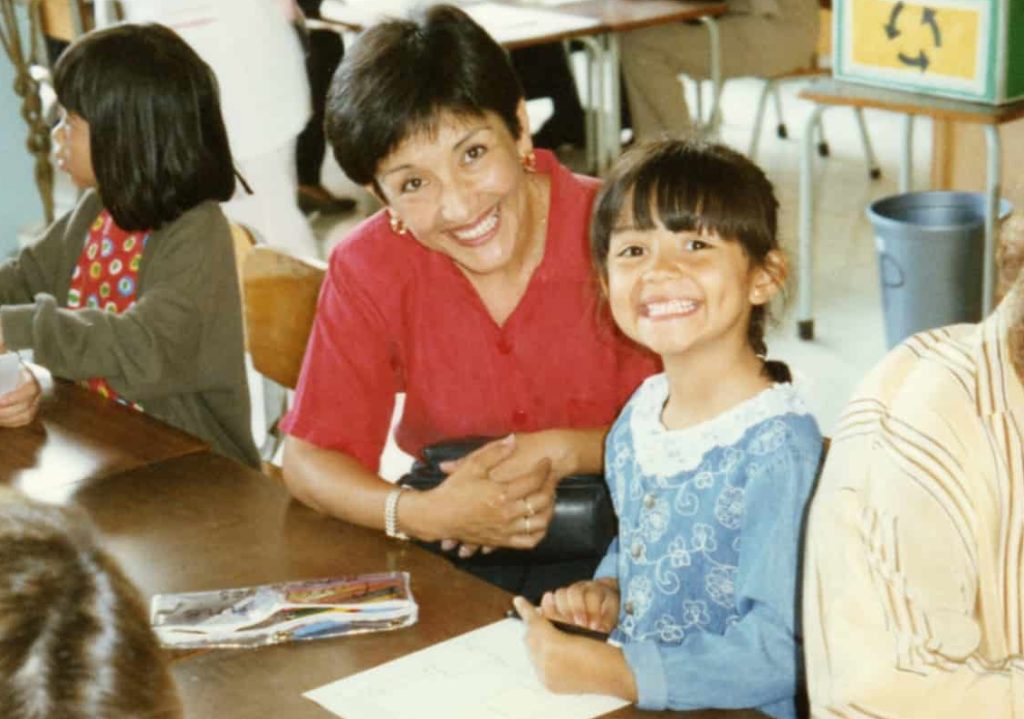
My beautiful mom with me at the last day of kindergarten. Photo taken by my dad, Thomas Bono. 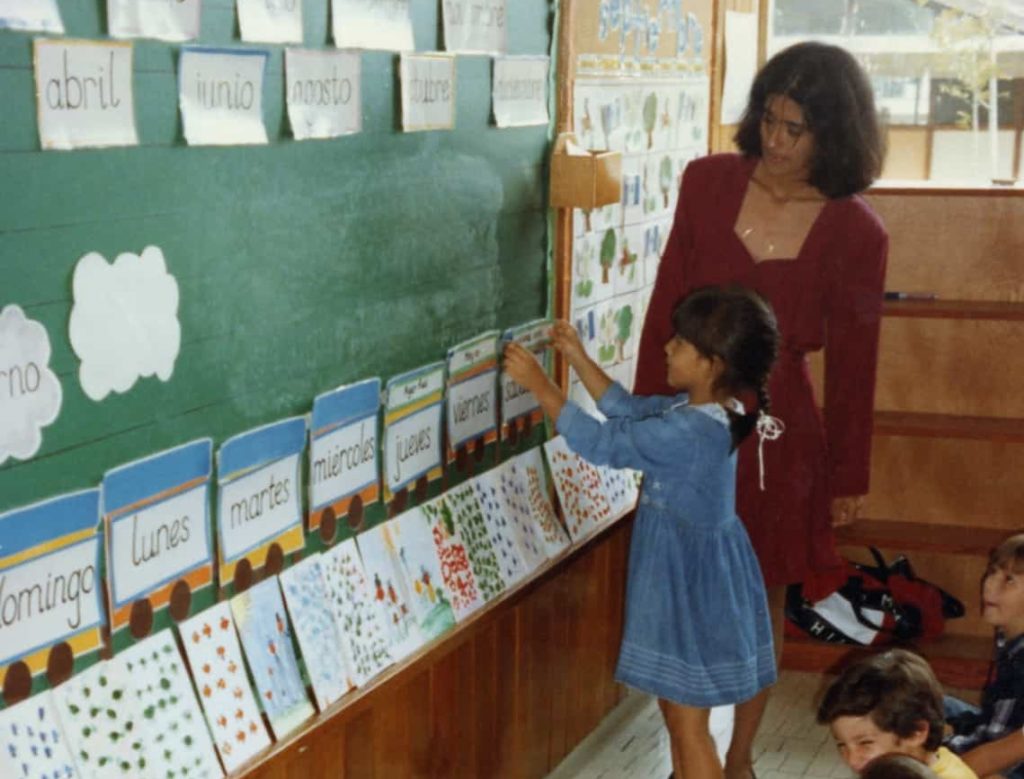
I knew my days of the week as a little baby kindergartner. Photo taken by my dad, Thomas Bono.
I was born in Guatemala. I grew up speaking Spanish and English, which made me quite the Spanglish baby/child/teenager (must admit, I’m still a Spanglish kid at heart). I graduated from Universidad Rafael Landívar with a major in communication sciences.
I moved to North Carolina in July 2016 to pursue an M.A. in mass communication with a focus on journalism at the University of North Carolina at Chapel Hill. While there, I co-founded Carolina Ahora, a Spanish news show that reports on relevant topics to the Latinx community on campus. During my last semester, I was the news director for both Carolina Ahora and Carolina Now.
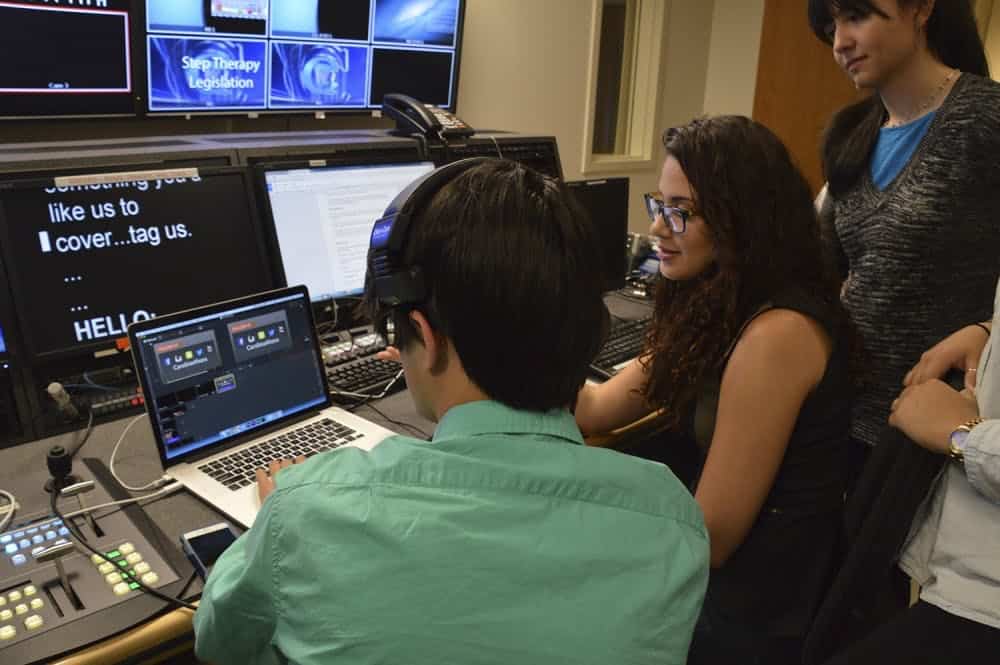
Navigating COVID 101
The week of March 9-15 promised to be an exciting one. I had several interviews lined up to produce content for Bridge 2020, a gathering to discuss the work being done and the work to be done to orient North Carolina’s students, educators, and leaders towards readiness and attainment.
This year, the agenda would focus on the Latinx experience regarding these topics. On Saturday, March 14, Gov. Roy Cooper issued an executive order that all K-12 public schools would close to limit the spread of COVID-19.
I must admit, as much as I pride myself on being prepared for any situation that may arise during an interview, nowhere in my manual did I have a “navigating COVID 101” chapter.
I had five interviews scheduled for that week back in March. Here are the stories of meeting four leaders that week, the last in-person interviews I have held since the pandemic hit. These conversations led to a series of articles highlighting Latinx voices in North Carolina. Explore those here.
Alex Villeda
I interviewed Alex at Cocoa Cinnamon. He was prepping for his medical board exams and would usually set up shop there to study.
I first met Alex when I produced a story on SALUD: the Scholar Academy for Latinxs United for Diversity. As the program director and founder of SALUD, Alex’s main objective is to offer Latinx students access to Latinx mentors.
“I was at this high school where a large percentage of the students were Latinx but I was the only Latino that was on staff,” he said. “I wanted them to feel confident and feel like they were capable of achieving what they wanted to achieve. I needed them to know that somebody believed in them and that they could accomplish their goals.”
He showed up to Cocoa Cinnamon with his daughter Yaslene. While I set up the equipment, they got something to eat. It warmed my heart seeing how Alex interacted with Yaslene. It was clear how much he cares about her and guides her through life.
As a third-year medical student, Alex is studying to become a pediatrician. Just going by the way he interacts with Yaslene, we need pediatricians like him — someone who cares about our children and respects them.
A few days later, Prometric centers closed indefinitely, which meant that Alex could no longer take the test he had been preparing weeks for.
Ricky Hurtado
When I got out of my car carrying several bags of video gear and made my way toward Ricky, his first words were, “Hey Carol! Do you need a hand with that?” I declined, since I’d much rather let me be a sweaty mess instead of my interviewee, but that gesture made me like him quite a lot.
Ricky proved to be great at rolling with the punches. We initially thought about recording inside the Carolina Latinx Center. However, the air conditioner was on full blast, which would be an issue while recording audio.
We were able to find a nice shaded area near the Old Well. As I set up, Ricky shared with me many of LatinxEd’s future projects, including the Somos Carolina Summer Academy, a three-week program meant to help rising eighth-graders embrace their culture, community, and leadership skills.
“That’s largely colored my journey — as a son of immigrants, as a student, then as a college student, and now as a professional in North Carolina — trying to really help our state see that we are entering a new, diverse, multicultural 21st century, and we need to embrace everyone that lives here.”
— Ricky Hurtado
As Ricky told me about LatinxEd, I couldn’t help but notice the passion in his voice, the excitement in his eyes. He truly gives a damn about our Latinx students and is making sure they have the resources they need to become leaders of our community and our state.
As part of his interview, I asked Ricky about his family’s migration story. He shared how his parents fled El Salvador in 1980 to escape a civil war. They got a one-way ticket to Mexico and eventually arrived in Los Angeles, California. “That’s not the end of our migration story,” he said. “It was right after the Rodney King riots in Los Angeles that my parents first experienced racial tension in America and began to get really nervous as to what that meant, raising kids in such a big city.” His parents sold everything, packed their car, and moved their family to Sanford, North Carolina in 1996.
“North Carolina has been home ever since,” he said.
Alessandro García
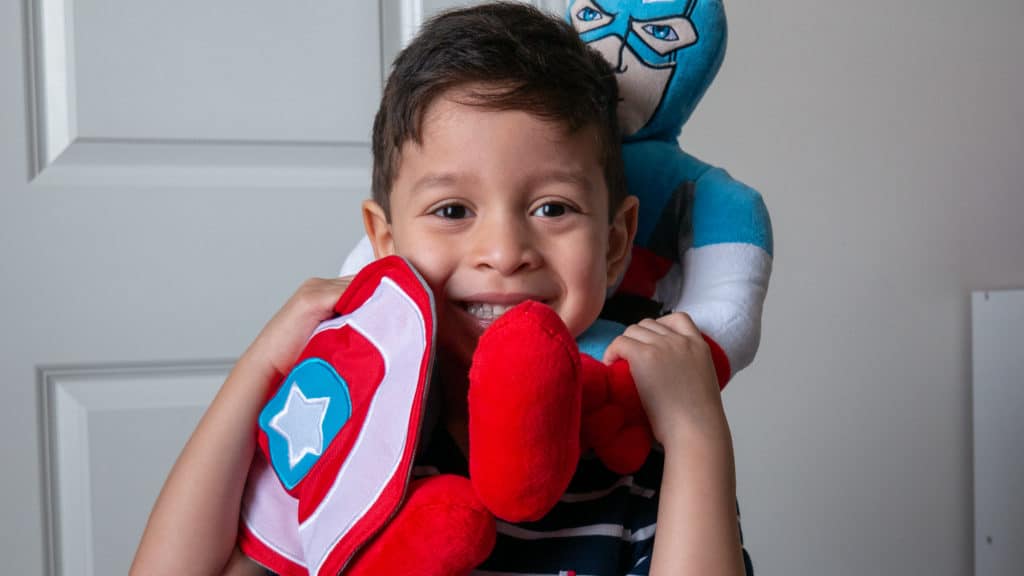
I was connected to Alessandro through Book Harvest. As a 3-year-old, he has been one of their Book Babies for most of his life.
His mom, Mari, let me interview him at their house. I got there just as she was pulling into their driveway. Alessandro got his hair cut and he had many lollipops to prove it.
Mari was very sweet and prepared Alessandro for his interview. For the past couple of days, she had recorded him with her phone, making sure he would be comfortable when I used my camera. Mari had also told him that I was a very good friend of hers.
The moment I interacted with Alessandro, he made me feel as if we were best friends. He immediately started showing off his drum skills and Spider-Man moves.
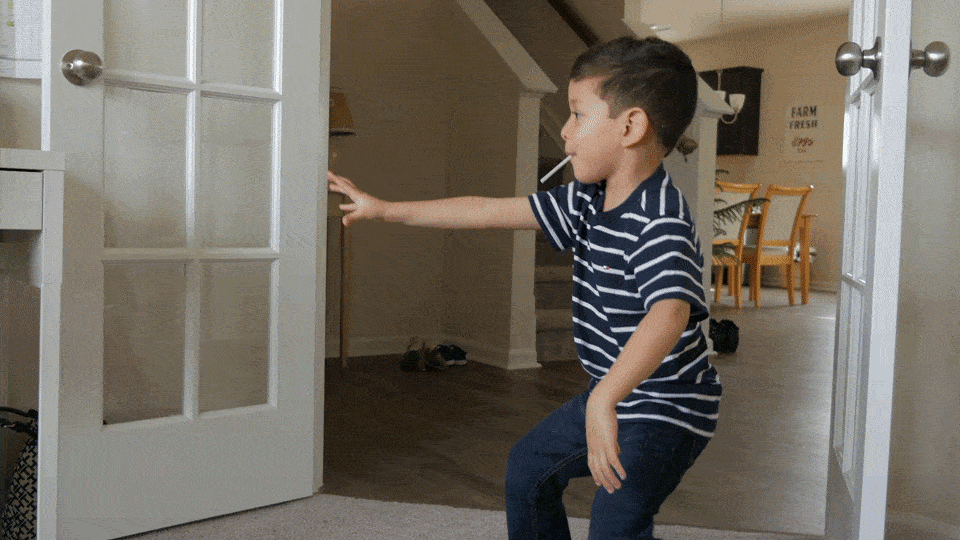
In the middle of his interview, he got up, dashed off, and said, “Come see all my toys!” Not wanting to give the wrong impression, I asked his mom if me going upstairs to his room would be OK. She laughed at his excitement and said I could go ahead.
Once I made my way toward Alessandro, he continued showing me all his toys: a horse so big he could ride it, several Hot Wheels, a Hulk fist smashing its way through the wall, and a Captain America toy. After a while, I asked him if he’d like to go back downstairs and wrap up his interview. We made our way down and managed to capture a few more minutes before he started playing with a set of magnetized blocks. At this point, it was clear that he was done playing interview and ready to play something else with his new friend. My heart melted to a puddle.
During this whole time, Alessandro had managed to polish off every single lollipop. When his mom realized what he’d done, she got that look in her eyes that you master as a parent when your kids do something they shouldn’t have. I excused myself and left the room to start packing up my gear.
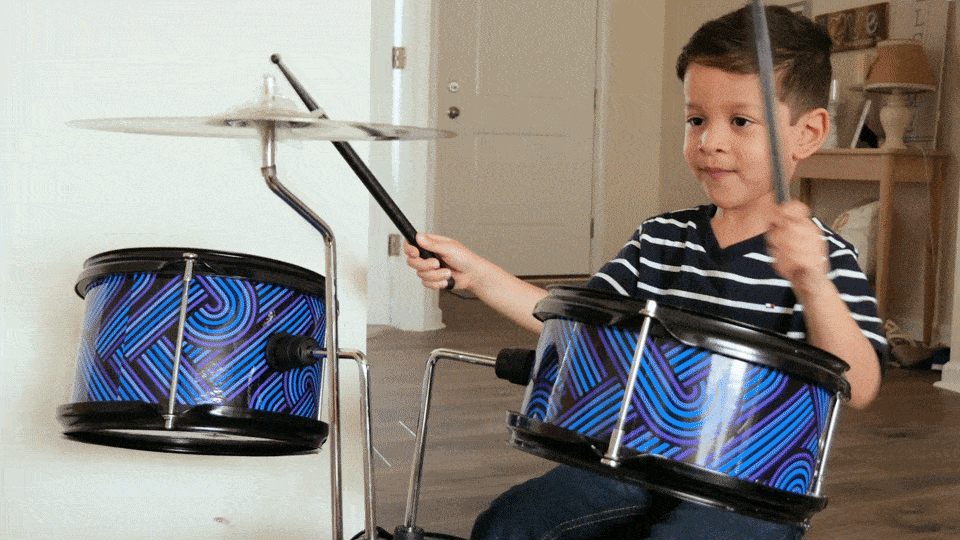
A few minutes later, Mari stepped out of the room and we got a chance to talk. I learned that she is a mechanical engineer. She and her husband moved their family from Venezuela to the United States three years ago, when Alessandro was a baby. She wondered what the best way was to work out at the gym with COVID-19 and how people will disinfect the machines after each use.
She offered me a piece of lemon meringue pie. A feeling of familiarity came over me. It was so comforting being able to speak Spanish with someone in person.
Before I knew it, I’d spent almost three hours at their house. I felt I’d taken up so much of their time already, but Mari thought otherwise. She invited me to stay and have homemade arepas with them. I sadly declined the offer — it took so much willpower saying no to arepas — but promised to come back another time. Alessandro made sure to give me a hug before I left.
Salma Villarreal
I met Salma on Friday, March 13. This was the same day school closures due to COVID-19 began in the Charlotte area.
I wanted to make sure she felt as comfortable as possible, even if that meant rescheduling. I showed up with my usual recording gear plus a canister of disinfecting wipes and hand sanitizer. When I got there, several staff members of ourBRIDGE for KIDS were on the phone, talking with parents about schools closing. I saw Salma and she took me to her office.
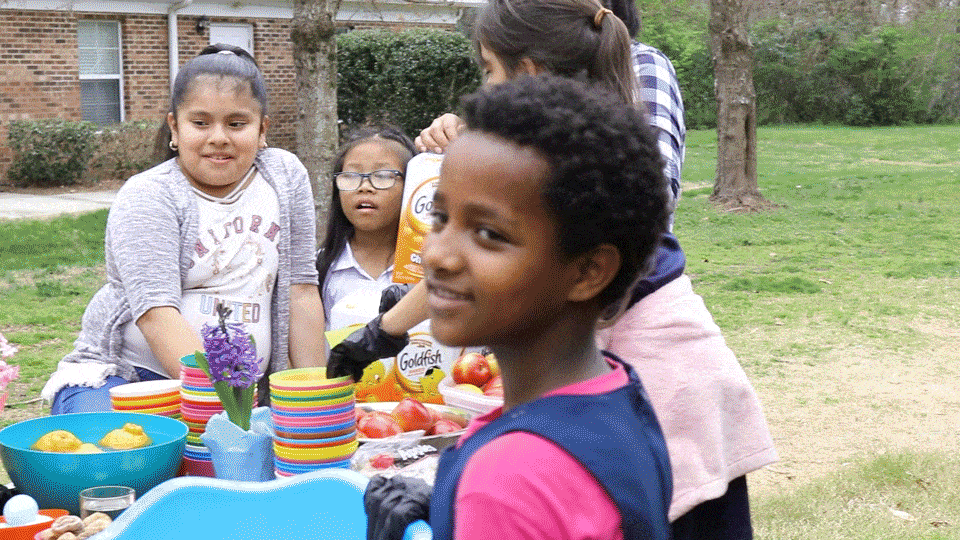
It’s been my privilege to follow along on a four-month journey to learn how ourBRIDGE has shifted its energy to better support 150 kids and their families in the safest way possible, while figuring out ways to make these efforts sustainable in the long run.
I’m not sure if this happened because of our initial heart-to-heart on the first day of COVID-19, but Salma opened up to me and shared how much she loves working with the kids at ourBRIDGE, what the program looks like, and how much she would have liked to have an ourBRIDGE growing up.
I thanked her for her time and her trust. “I’ve never felt so comfortable talking, especially on camera, oh my goodness,” she said.
Salma took me around the building, showing me how they’d set up the classrooms. She told me the kids and staff were cleaning in preparation for the Persian new year, a time when you clean up to make room for what’s to come. I felt I fit right in with my disinfecting wipes.
We walked outside and found several kids around a picnic table. The camera immediately got polarizing reactions: some kids covered their faces, others ran toward me.
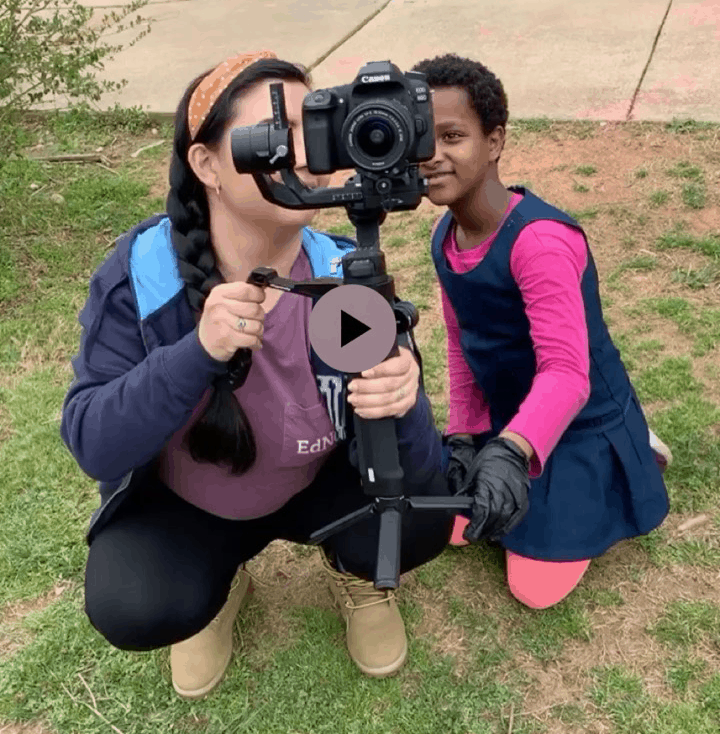
Winta was super curious about the camera, and she even started moving the gimbal to see how it worked. Courtesy of Salma Villarreal. 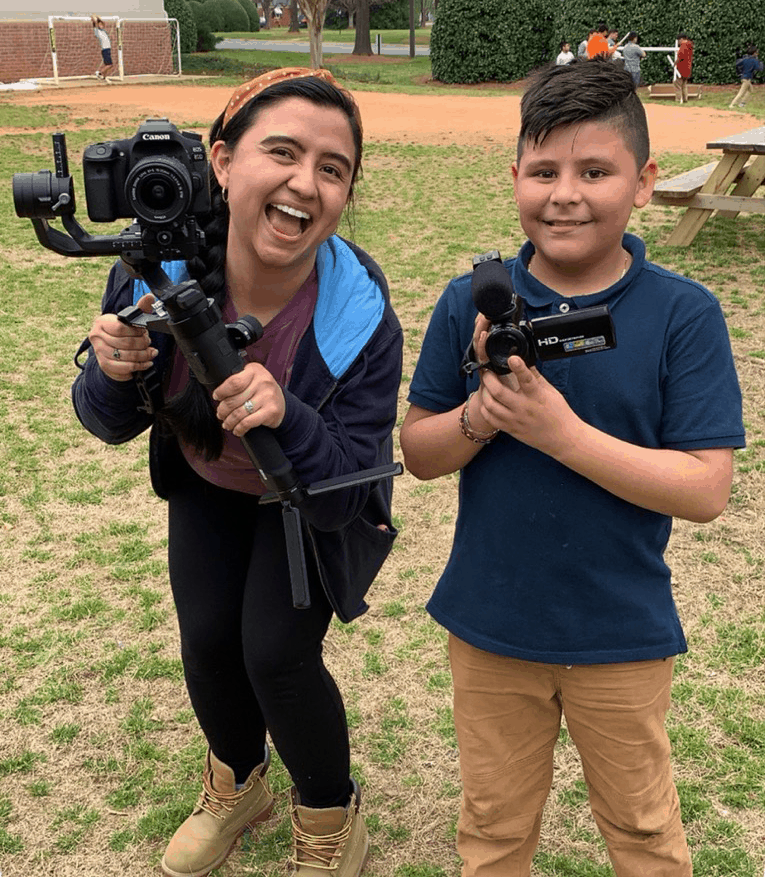
Angel and I appreciated that we are kindred spirits. Courtesy of Salma Villarreal.
I met Winta, who smiled at me and offered some of her chocolate coins. I showed her how the gimbal works.
Kevin started hamming it up for the camera. He got into a pose, thinking I was taking a photo, and ran away the moment I told him it was a video.
I saw Angel, who had his very own camera. We recorded each other for a moment.
All these kids were so happy. They’re surrounded by people who care about them and remind them every day that this is where they belong.
This was the last day the staff would be able to interact with the kids in the building.
What’s next
Following the Comunidad series, I will continue to share the voices of the Latinx community in North Carolina — including translated articles in Spanish.
What are your ideas and thoughts? Please email me story ideas, leads, and comments to CBono@EdNC.org.
To sign off, thank you so much for reading and getting to know us. Here is my wish:
“[F]or so long, there have been so many things that don’t work for all students. COVID-19 widened those inequities, inviting all of that, and showed us that there really is a system that works for white, privileged, wealthy students and doesn’t work for kids on the other spectrum. I really hope that people are now looking at ways that we can redo things, reimagine education, and live in a more equitable society because of COVID.”
— Salma Villarreal
